2025 Fall Update
Taking on Corruption, Capitulation and Attacks on Democracy
A MESSAGE FROM OUR CO-CEOs
2025 has been full of threats to our democracy. With civil, human and constitutional rights under attack, Free Press and Free Press Action have fought authoritarianism, protected press freedom and advocated for journalism that gives people the news and information they need to thrive.
We’re fighting Trump’s war on journalists and the truth, and exposing the media and tech billionaires who are surrendering to Trump’s tyranny. We’re helping people understand how terrible media and tech policies have enabled this state of affairs. We’re building powerful coalitions and taking our fight to the states to foster support for media that actually meets communities’ needs.
We’re proud of how our team is meeting this frightening moment in our nation’s history. We have been at the forefront of issues ranging from corruption at the FCC to corporate capitulation to threats to public media — and have helped people understand why and how our media system is failing us.
We remain committed to our mission of promoting a just and equitable media system that serves a multiracial democracy. Your generous support keeps Free Press and our sister organization, Free Press Action, independent from the government, political parties and the industries we track — and allows us to work solely for the public interest. Read on to learn what you’ve helped us accomplish so far in 2025.
Onward,
Craig Aaron and Jessica J. González
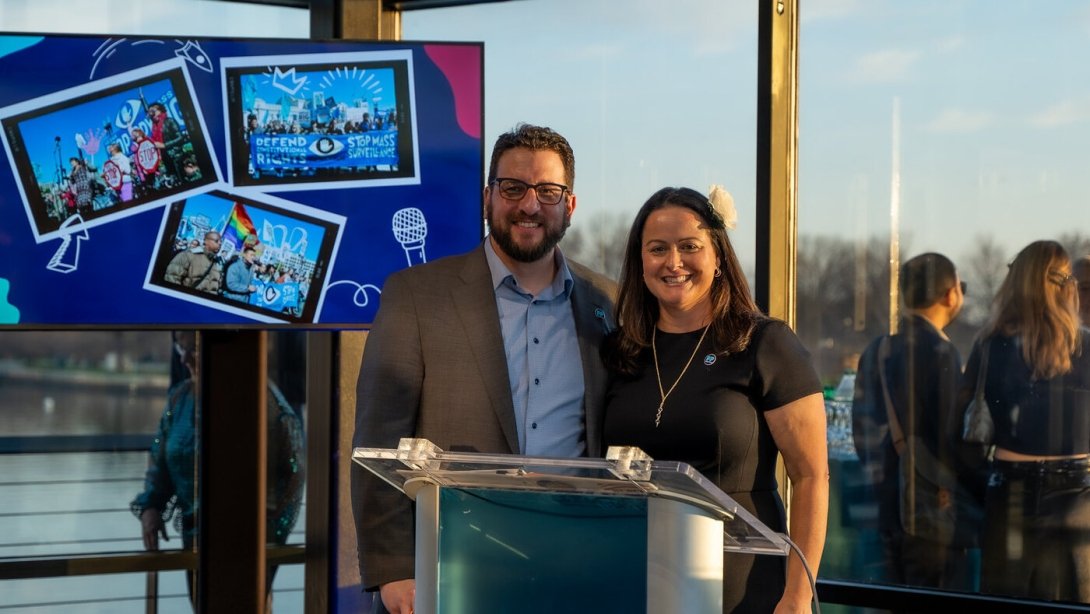
Courtney Morrison
FIGHTING AUTHORITARIANISM
Attacking the press is a classic strategy from the authoritarian playbook. President Trump — who has described the press as the “enemy of the people” — has ratcheted up his attacks on journalists and media companies in his second term. He’s targeted reporters who critique him, revoked press passes and filed multibillion-dollar lawsuits against newsrooms — even as he’s given special access to regime-friendly propagandists. Billionaire owners of outlets including The Los Angeles Times and The Washington Post have tried to curry favor with him instead of fighting to protect their papers’ journalistic integrity.
And they’re not alone: Tech billionaires including Amazon Chairman Jeff Bezos, Google CEO Sundar Pichai, Meta CEO Mark Zuckerberg and X Chairman Elon Musk — plus the owners of broadcasting giants — have cozied up to Trump to boost their profits, secure merger approvals and snag lucrative government contracts. Throughout the year, Free Press has spoken out about how these leaders are prioritizing their bottom lines over the health of our democracy.
In February, Free Press Action Co-CEO Craig Aaron testified in a House hearing on the “censorship-industrial complex.” He discussed how the Trump administration is using the power of the government to shake down the media and quash dissent. “I’m a former journalist, sitting here with a panel of journalists,” he said. “I may not agree with them, but I will defend their rights to speak and write without fear of intimidation and harassment by government officials, without fear of unlawful government surveillance for simply speaking to their sources, without fear of unconstitutional censorship and retaliation.”
This year, we launched our Future of Freedom campaign to push back against these authoritarian threats. We’re documenting how Trump’s second term has featured exhaustive attempts to roll back basic rights, gut agencies to eliminate checks on his power and demonize any groups — including universities, activists, law firms, public-health experts and artists — that refuse to capitulate. We’re convening internationally known experts, lawmakers and members of the media to offer public education about the states of this moment — and how to defend our collective freedom.
We’ve organized a range of webinars, including “Free Speech in the Age of Retaliation” and “Defeating Authoritarianism,” featuring Nobel Peace Prize laureate Maria Ressa.
Campaign Manager Ruth L. Nuñez created a powerful toolkit, “Organizing Against Authoritarianism,” and presented it at the Netroots Nation conference. This toolkit gives journalists, newsrooms, activists and others strategies to stay safe while pushing back against authoritarian threats. We’ve also created and distributed other resources on topics including protest rights and how to recognize the red flags of authoritarianism.
HOLDING FCC CHAIRMAN CARR ACCOUNTABLE
Free Press was the first group to warn about Brendan Carr’s threats to democracy. Back when he was an FCC commissioner, we documented how he undermined the public interest at every opportunity. In 2024, we exposed his ties to Project 2025 and his threats to free speech. And we showed how his bid to become FCC chairman revealed his willingness to punish Trump’s enemies. “Carr hasn’t just flirted with violating the First Amendment rights of companies the FCC has clear authority to regulate,” Co-CEO Jessica J. González wrote in The Hill soon after the 2024 election. “He plans to extend his crusade to entities the agency has no mandate to oversee.”
Carr’s tenure as FCC chairman has shown just how far he’s willing to go to serve Trump — with the Jimmy Kimmel debacle a telling example of his overreach. In September, Carr pushed Disney/ABC and its affiliates to cancel Jimmy Kimmel’s show after the host made comments about how right-wing extremists were responding to the killing of Charlie Kirk. “We can do this the easy way or the hard way,” Carr said in an interview with right-wing podcaster Benny Johnson. “These companies can find ways to change conduct and take actions on Kimmel, or there’s going to be additional work for the FCC ahead.”
After broadcasting-station giants Nexstar and Sinclair subsequently announced they would preempt Kimmel’s show, Disney/ABC caved and announced it was suspending the program “indefinitely.” “Donald Trump and Brendan Carr have turned the FCC into the Federal Censorship Commission, ignoring the First Amendment and replacing the rule of law with the whims of right-wing bloggers,” Craig Aaron said. “This is nothing more than censorship and extortion.”
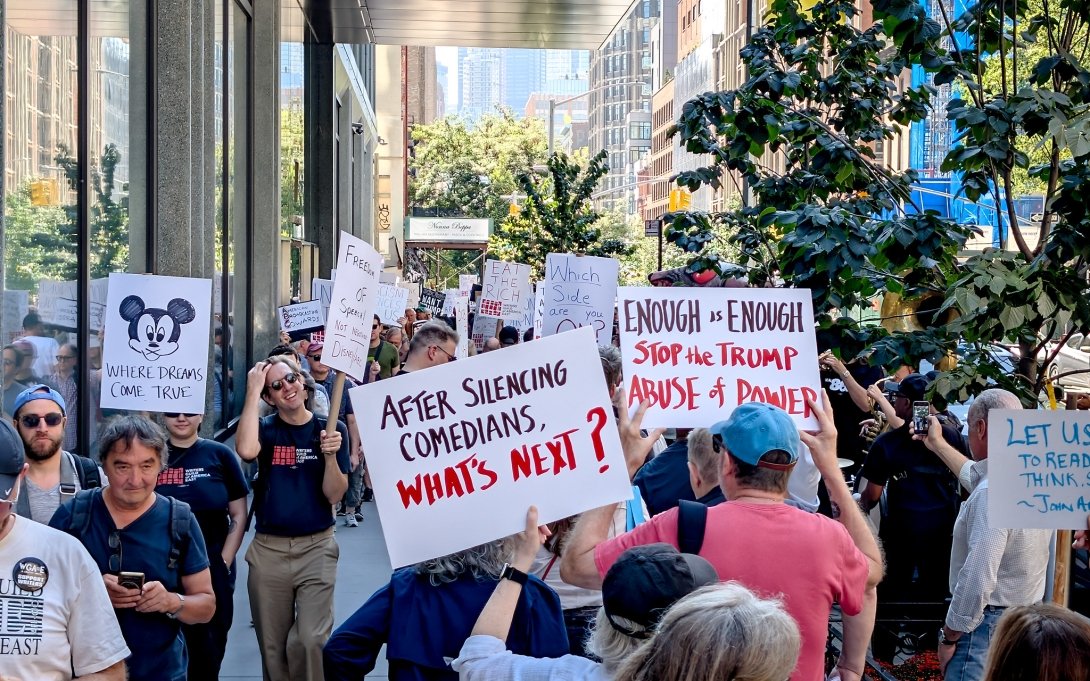
Timothy Karr
Free Press immediately kicked into action, mobilizing thousands of people in just a few hours to call their local ABC affiliates and urge them to put Kimmel back on the air. Free Press staff also took part in nationwide protests, and we helped the media make sense of the issues at stake. The public outcry — including 1.7 million canceled Disney+ subscriptions — forced the companies to put Kimmel back on the air and made Carr a household name (and the target of derision) from other late-night shows and even South Park.
Though the Kimmel debacle grabbed the spotlight more than anything else Carr has done, he’s abused his power throughout the year. After Trump sued Paramount-owned CBS for $20 billion over its standard editing of a 60 Minutes interview with then-Vice President Kamala Harris, Carr delayed approval of Paramount’s merger with Skydance. In March, Free Press filed comments at the FCC stating that the Trump lawsuit and a related proceeding that Carr initiated were meritless and should be dismissed: “If the agency goes any further with this inquiry, it will stoke fear among journalists that acting within their professional discretion to edit raw footage is worthy of government scrutiny,” said Legal Director Yanni Chen. “And perhaps that’s the FCC’s goal.”
Only after Paramount ponied up $16 million to settle the case did the FCC approve the merger with Skydance — and even then, it did so with an important condition: that CBS News appoint an ombudsman to oversee its coverage. The network subsequently chose a Trump supporter with no journalistic experience.
In February, Free Press condemned Carr’s decision to launch investigations into the DEI policies of Comcast and Verizon. Comcast subsequently canceled MSNBC programs that journalists of color hosted, and Carr approved Verizon’s merger with Frontier only after it dropped his DEI policies. In March, Carr explicitly threatened to withhold merger approvals from any companies that promote diversity, equity and inclusion. “Carr is abusing his power by threatening to hold up mergers or otherwise punish companies with government investigations for failing to fall in line with Trump’s extremist agenda,” said Jessica J. González. “In doing so, he is eroding equal opportunity.”
In April, Free Press submitted comments denouncing Carr’s “Delete, Delete, Delete” proceeding, an attempt to eliminate decades of consumer protections. Potential rollbacks include proposals to stop the collection of Equal Employment Opportunity information from licensed broadcasters, narrow or remove digital-discrimination rules, and get rid of truth-in-billing rules. We’re calling out this effort to undermine the agency’s mission of serving the public interest.
STANDING UP FOR FREE SPEECH
In May, we organized a powerful event in Los Angeles with FCC Commissioner Anna Gomez as part of her First Amendment tour. The gathering, held in a packed venue at California State University, Los Angeles, featured discussions between Gomez, Rep. Raul Ruiz and a panel of local advocates and experts. The public also had the opportunity to testify about their own experiences in the face of escalating government threats to free speech.
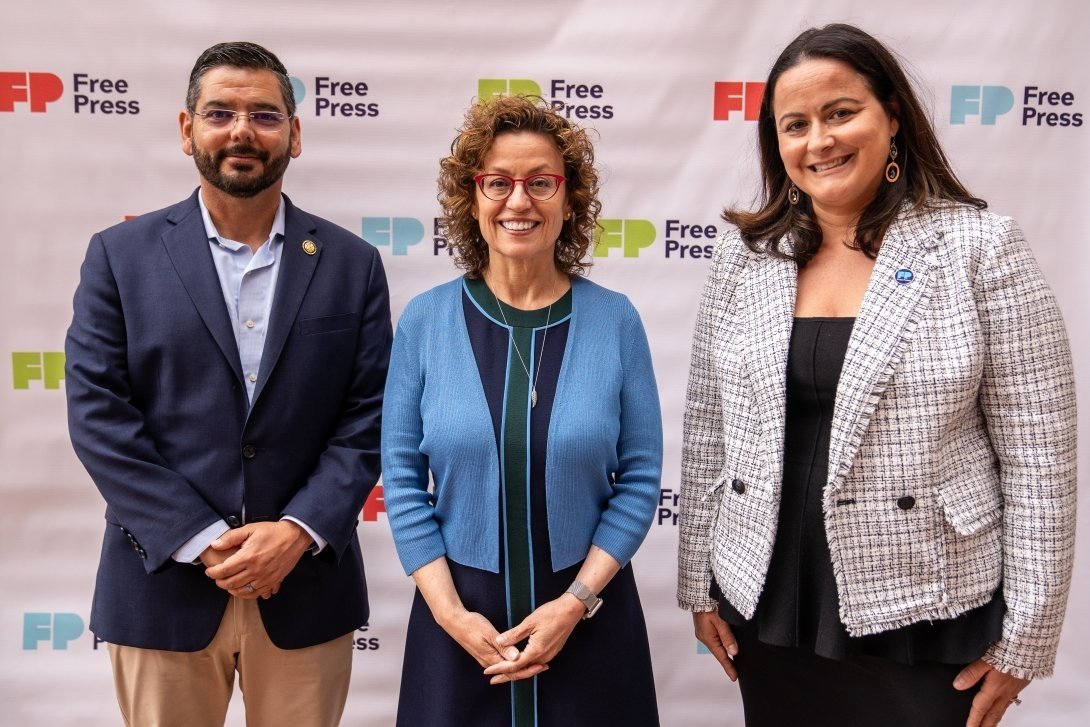
Rep. Raul Ruiz, FCC Commissioner Anna Gomez and Free Press Co-CEO Jessica J. González
Halline Overby
“I launched this First Amendment tour to bring attention to this administration’s campaign of censorship and control,” Gomez said during the event. “We all need to understand what is happening and we need people to speak up and to push back.”
We highlighted how Gomez’s bravery has stood in sharp contrast to Brendan Carr’s abuses of power. “Gomez has put her job in jeopardy by speaking out against the administration-wide crusade against dissenting voices in the media,” said Jessica J. González, who moderated the event. “This administration wants to whitewash U.S. history and shut down the diverse viewpoints that are fundamental to a healthy democracy.”
One of the speakers, veteran journalist Gabriel Lerner, shared powerful remarks that connected his experience growing up during a time of repression in Argentina to what’s happening in the United States today. “Attacks on the press can be the introduction to regime change,” he said. “Like the courts, the universities, the lawyers, the media are essential to keeping our hopes alive.”
We’re holding a follow-up event with Commissioner Gomez this November in New Jersey.
FIGHTING TO SAVE PUBLIC MEDIA
For “Protect Public Media Day,” Free Press joined dozens of activists and allies from Our Revolution, the ACLU and the Communications Workers of America for a rally held outside NPR headquarters. The groups protested attacks on public media from Congress, the FCC and the Trump administration. “A vibrant, independent public-media system is essential to a healthy democracy,” Craig Aaron told the crowds. “So it’s no wonder that Donald Trump and Elon Musk hate public media.”
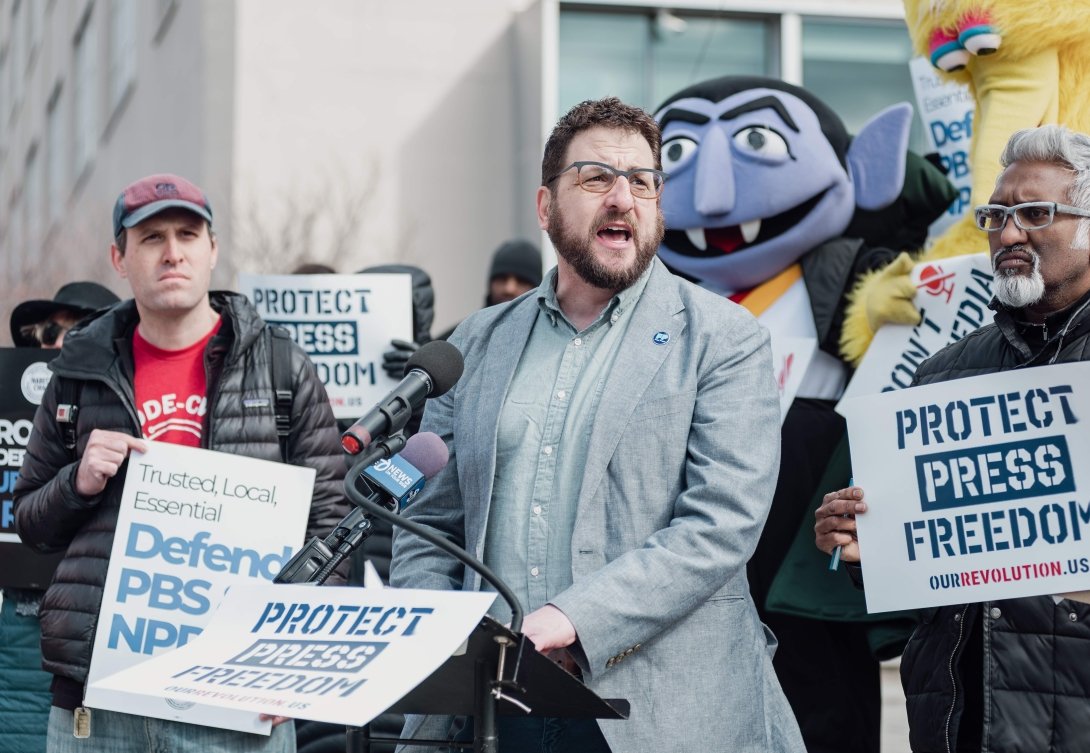
Free Press Co-CEO Craig Aaron speaking at a “Protect Public Media Day” protest
Alex Sakes
Despite the overwhelming trust people of all political stripes place in public media, lawmakers have long threatened to gut the Corporation for Public Broadcasting. This year, Free Press Action helped lead the nationwide opposition to Trump’s demand that Congress rescind the $1.1 billion it had previously appropriated for the CPB.
In response to our outreach, thousands of our members called lawmakers to urge them to reject this request. To educate people about the stakes in this fight, we teamed up with Partners in Health, Public Citizen and other allies to organize a virtual town hall highlighting the threats to public media — and to the other targets of the rescission request, including disaster-relief programs and essential international efforts like UNICEF. During this event — which more than 1,000 people attended — we highlighted how these cuts represented a senseless attack on essential educational programming, invaluable journalism and lifesaving emergency alerts.
Despite our best efforts, Congress passed the rescission package — and in August, the CPB announced that it would cease operations by the end of the year. “With this vote, Congress has abandoned local communities, abdicated its constitutional responsibilities and dealt a devastating blow to what’s left of our democracy,” said Craig Aaron. “This is a vote to evade public accountability and hide the Trump administration’s destructive actions from independent scrutiny.”
There’s no sugarcoating it: This is a devastating loss, especially for stations in rural communities that drew a majority of their funding from the CPB. But this crisis also gives us the opportunity to create a new public-media system that’s grounded in community, committed to local newsgathering and freed from partisan meddling.
Our campaign to save public media drew widespread attention and attracted new followers, supporters and allies — including local station managers, public-media journalists and documentary filmmakers. We’re convening discussions about ways to create a sustainable future for public media. “The battle on the federal level is lost, for now,” said Free Press Action Campaign Manager Alex Frandsen. “But frontiers are opening up in states and cities across the country to forge a new kind of public infrastructure for local media and civic information.”
EXPOSING MEDIA CAPITULATION

In July, we launched the Media Capitulation, an investigation into the independence of the 35 largest media and tech conglomerates in the United States. Almost all of them are failing to defend democracy and a free press against authoritarian threats. This capitulation to the Trump administration is a pervasive trend that applies to nearly all commercial media, including cable and telecommunications firms and online platforms. Our index rates the companies on a scale from “independent” to “vulnerable” to “compromising” to “capitulating” to “obeying” to “propaganda.”
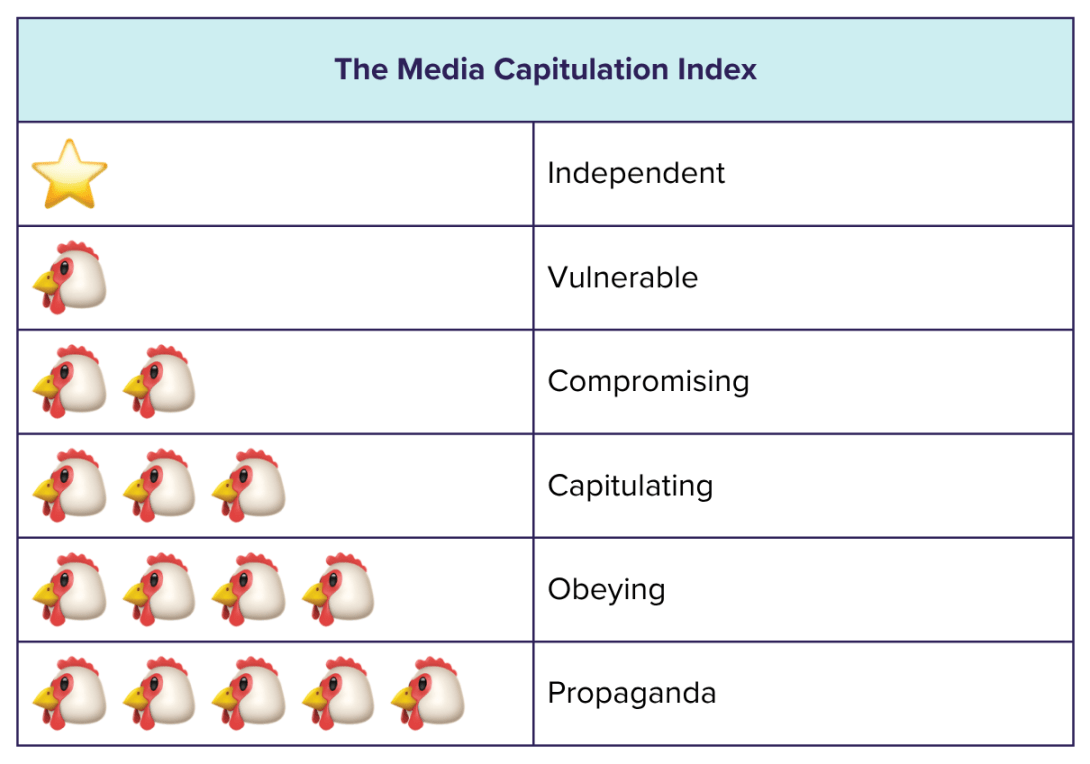
“Media capitulation is a slippery slope,” said Timothy Karr, who led the investigation. “Once these owners compromise their companies’ editorial independence — once they step across the line into compliance — the temptation to cave further to official pressure grows even stronger. The editorial slide toward state propaganda becomes inevitable when a media owner’s financial interests align fully with those of a corrupt and bigoted regime.”
Karr wrote the accompanying report: A More Perfect Media: Saving America’s Fourth Estate from Billionaires, Broligarchy and Trump. The study offers a number of solutions to the capitulation crisis, including funding the kind of independent journalism that holds the powerful accountable.
Both the report and the Media Capitulation Index drew considerable press attention, with significant coverage appearing in NiemanLab and the popular “American Crisis” newsletter from former New York Times public editor Margaret Sullivan.
DEFENDING JOURNALISTS UNDER ATTACK
For months, Free Press pushed the government to release reporter Mario Guevara from ICE detention. Guevara was the only journalist in custody in the United States whose arrest related to newsgathering. ICE arrested him in June while he was covering a No Kings Day protest in Atlanta. Even though the charges against Guevara were dropped — and even though he’s a legal resident of the United States — he remained in detention for more than three months, primarily in solitary confinement.

Facebook page for Mario Guevara
Senior Counsel and Director of Digital Justice and Civil Rights Nora Benavidez delivered powerful comments about Guevara at the Georgia statehouse at a July press conference we held with other groups. “If people like Mario Guevara are somehow cast as dangerous,” she said, “that says more about the kind of nation we are becoming than it does about who Mr. Guevara is.” In August, we joined with other press-freedom groups to send a letter to Homeland Security Secretary Kristi Noem calling for Guevara’s immediate release.
After the Board of Immigration Appeals called for his imminent deportation in September, we joined forces with the Committee to Protect Journalists and other press-freedom groups to condemn the decision and call for emergency relief. Later that same month, we filed an amicus brief with this same coalition in support of Guevara’s habeas corpus petition challenging his prolonged confinement. But the U.S. Court of Appeals for the 11th Circuit — while acknowledging Guevara’s First Amendment rights — cited his failure to file certain immigration documents as justification for his deportation to El Salvador. This was a horrifying outcome — and we will keep fighting for Guevara until he is free to return to the United States.
In June, we joined a coalition of other free-speech groups to file an amicus brief in United States v. Burke, a federal criminal prosecution that seeks to convict reporter Timothy Burke for publishing unaired footage from the former Fox News talk show Tucker Carlson Tonight. “The court’s decision in this case has massive ramifications for reporters and everyday people alike,” said Yanni Chen. “Reporters must not be forced to refrain from using the internet to gather newsworthy content just because powerful entities want to keep what journalists find under wraps.”
We had a big win in September when a judge dismissed seven of the 14 charges against Burke — and cited our brief in her ruling. “At a time when journalists face increasing risks for doing their jobs of holding power to account,” said Yanni Chen, “this ruling affirms the essential protections they deserve and sends a clear message: The law cannot be twisted to criminalize newsgathering.”
ORGANIZING FOR MEDIA REPARATIONS AND CULTURAL REPAIR
As free speech and diversity, equity and inclusion face unrelenting attacks, Free Press’ Media 2070 team has helped people imagine a better future. In May, the team presented the “Riot to Repair Soundscape Exhibition” in Los Angeles as part of the ongoing Black Future Newsstand series. An immersive multimedia exhibit presented in collaboration with a range of partners, Riot to Repair invited people to step into a world where Black narratives are celebrated and uplifted.

A woman examines objects in the living room created for the Black Future Newsstand exhibit in Los Angeles.
Halline Overby
The centerpiece of the exhibit was an audio archive that Dr. Allissa Richardson and students at the USC Charlotta Bass Journalism & Justice Lab created. The archive features interviews with L.A. residents describing their experiences of the death of George Floyd and the 2020 racial-justice uprisings. “Riot to Repair” also included panel discussions, workshops and four additional installations, including a depiction of a grandmother’s living room that paid homage to the different places and people that create space for Black storytellers to thrive. The multidisciplinary exhibit captured the power of culture, media and arts to tell reparative and transformative stories.
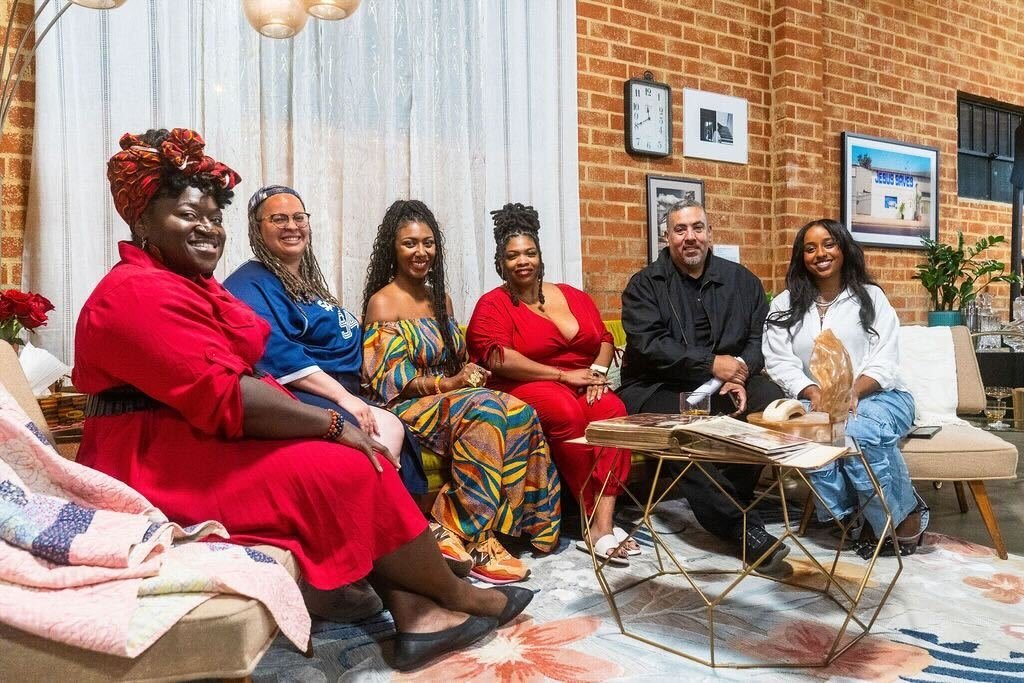
Members of the Media 2070 team sit within the Black Future Newsstand exhibit
Halline Overby
Media 2070 is partnering with PECAN Project to bring the Black Future Newsstand to Houston in October. Featuring art, music, media, live performance, teach-ins and more, the exhibit will explore how Afro-Texans have created media-care models and shared reparative storytelling around climate justice, technology and reproductive rights. Previous versions of the newsstand appeared in Harlem, Austin, Chicago and Los Angeles.
Media 2070 co-founder Joseph Torres advanced the fight for reparations in a number of important columns and interviews. In a piece for The Objective, he wrote about how FCC policies have undermined the 14th Amendment rights of Black people and Black communities. He delved into some of these policies in interviews with CounterSpin, which is heard on 160 radio stations across the country.
“The Federal Communications Commission today is trying, as part of Trump’s agenda, to roll back the very protections that were won over the past 60 years, as a way to consolidate power,” he said. “The FCC is pushing companies to roll back their commitments to DEI, but really, it’s saying the presence of Black and Brown people within these institutions represents something inherently illegal or unlawfully gained.”
STRENGTHENING JOURNALISM IN THE STATES
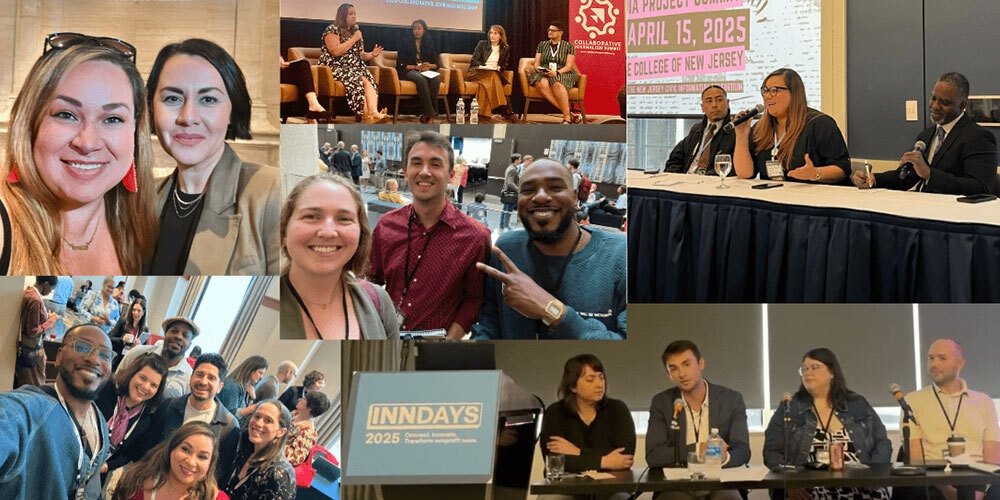
Vanessa Maria Graber
In June, Free Press Action played a key role in saving funding for the New Jersey Civic Information Consortium. Since 2021, the NJCIC — which we helped create and continue to guide — has awarded grants to more than 50 organizations focused on diversifying journalism, improving government transparency, providing community-health news and better serving communities of color and immigrant communities. Earlier this year, Gov. Phil Murphy’s proposed budget zeroed out funding for the NJCIC, but a groundswell of support from state civic leaders and residents — including a critical contingent of Free Press Action members — swayed policymakers. The state subsequently allocated $2.5 million for the consortium in the 2026 budget.
Earlier in the year, Free Press Action released Local News for the People: A Policy Agenda for Meeting Civic-Information Needs. The Free Press Action-led Media Power Collaborative created this blueprint, which urges lawmakers to treat local news like the public good it is. More than 60 leading journalism, pro-democracy and civic-information organizations and outlets have endorsed the agenda.
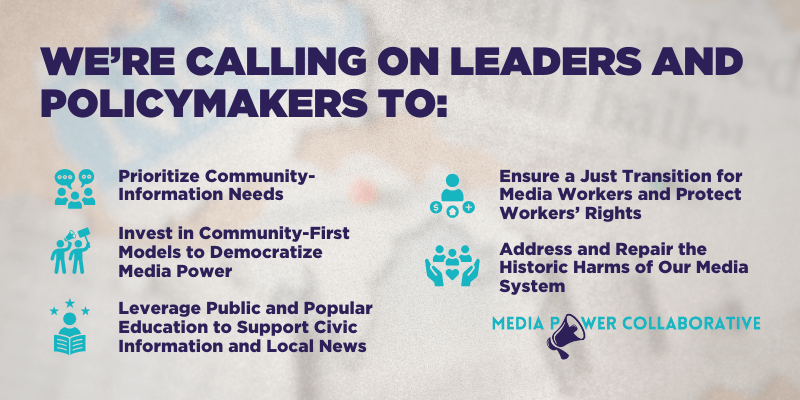
“The values and recommendations laid out in Local News for the People will help ensure that communities have the news and information they need to connect, coordinate and survive while building toward a brighter future,” said Senior Director of Journalism and Civic Information Mike Rispoli. “This crisis calls for robust public funding of a media system with sturdy firewalls in place to preserve editorial independence.”
The Media Power Collaborative, which Free Press Action launched in 2022, brings together hundreds of journalists, civic leaders, movement organizers and researchers to develop and win transformative journalism policies. In 2025, we launched working groups in California and Massachusetts, and are planning to organize groups in Pennsylvania and Wisconsin. In April, we brought together community members in Chicago to advocate for the news they need.
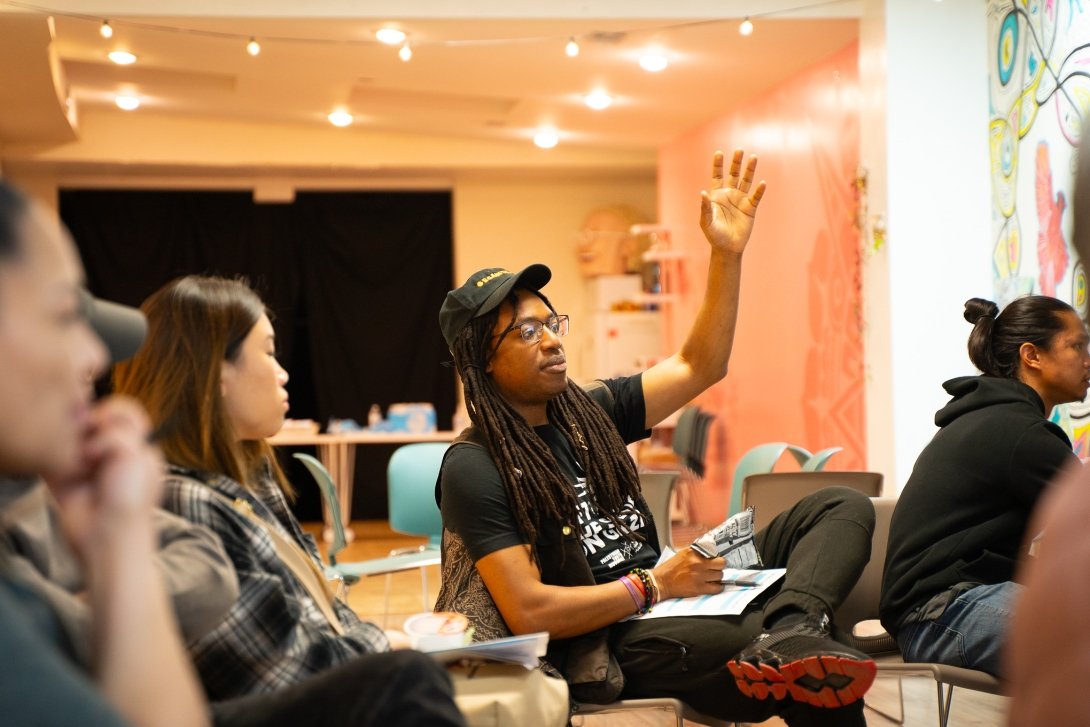
At Free Press’ event in Chicago’s Pilsen neighborhood, people said that the media’s coverage of their community is overwhelmingly negative.
Courtney Morrison
In California, a proposed Civic Media Program would allocate $10 million in public funding and $10 million in funding from Google to strengthen local journalism. The state has lost 25 percent of its newspapers since 2004, and we are urging lawmakers to invest sufficient funding to address the dire need in the state. We’re also raising red flags about the decision to have the Governor’s Office of Business and Economic Development administer the program.
On a brighter note, California lawmakers have allocated $15 million to continue supporting the Local News Fellowship program, which helps early-career journalists working in underserved communities across the state. More than 100 journalists have taken part, with fellows reporting on topics including education, local government, the environment, housing and law enforcement. Mike Rispoli is a member of the advisory board, and Free Press Action has been involved with the fellowship program, which is housed at UC Berkeley, since its creation in 2022.
The journalism team held a number of events in 2025 to advocate for bold policy solutions to the local-news crisis. Free Press Action is working to build momentum for two bills in Pennsylvania: one would create a Pennsylvania Civic Information Consortium modeled after the NJCIC, and one would create a state fellowship for local reporters.
TRANSFORMING THE FUTURE OF JOURNALISM
The Philadelphia Safer Journalism Project, a project of Free Press and Media 2070, launched Safer Reporting for Safer Communities: A Code of Ethics for Community Reporting in Philadelphia. The project provides an in-depth approach to reporting on public safety for newsrooms, highlighting the need for balanced reporting that is transparent and representative of the communities covered. The Public Safety Coverage Cohort, a group of Black and Brown storytellers in Philly, wrote the code of ethics and will be taking ownership of the project going forward.
In 2023 and 2024, Diamond Hardiman, Courtney Morrison and Qing Saville created the powerful Reparative Journalism Video Series. In May 2025, this three-part series beat out some industry heavyweights to win the bronze prize in the Education & Discovery category at the international Telly Awards, which honors excellence in television and video. This year, the team also released a reflection and discussion guide as a companion to the series; the resource is aimed at journalism professors, students and newsroom leaders.
FIGHTING MEDIA CONSOLIDATION
Free Press has long documented how the FCC’s weakening of its media-ownership rules has fueled media consolidation and limited ownership opportunities for women and people of color. A proposal from Brendan Carr to eliminate TV-station ownership limits would supercharge this trend and unleash waves of consolidation on a truly unprecedented scale.
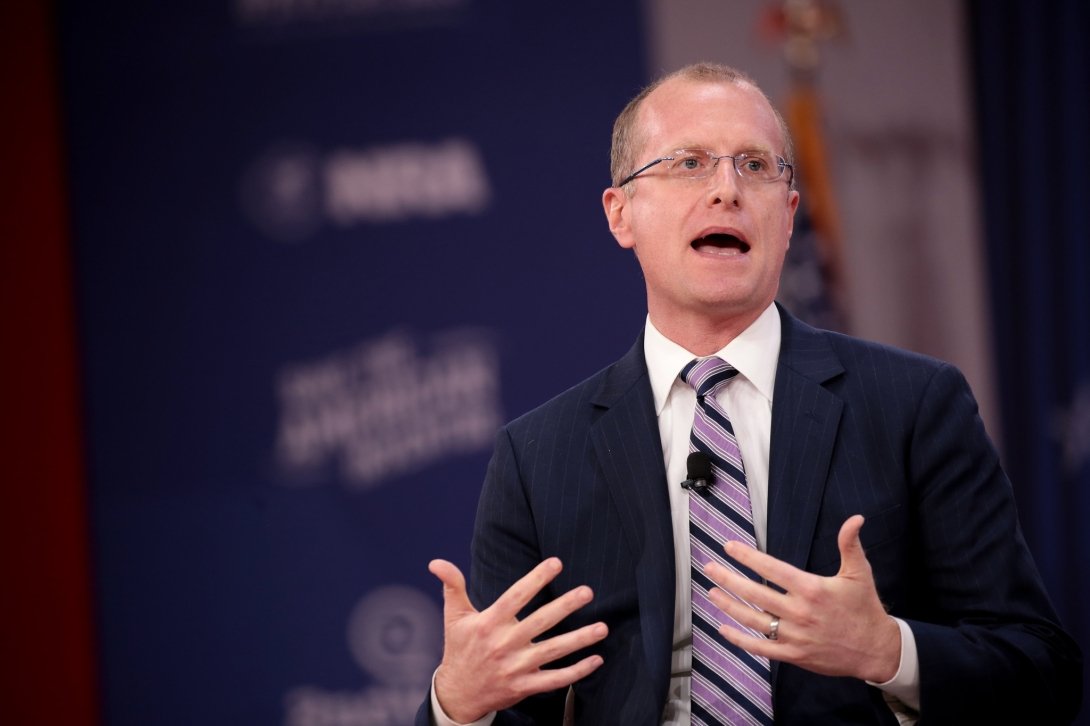
FCC Chairman Carr’s plan would lead to a wave of media mergers with disastrous harms for local communities.
Gage Skidmore
And Carr’s proceeding is unlawful: Only Congress — which set this cap — has the authority to remove it and thus far has declined to do so. In comments we submitted in August, we slammed Carr for violating the law, settled precedent and the First Amendment in pursuit of a partisan agenda. Later that same month, we joined with civil-liberties organizations, labor unions and other press-freedom groups to urge the FCC to press pause on this reckless plan and first assess how media consolidation has restricted communities’ access to local news and information.
Not long after Carr opened the ownership proceeding, Nexstar Media Group — the nation’s largest television-station conglomerate, and one that has already bent the knee to Trump — announced its plans to buy its rival Tegna, the country’s fourth-largest broadcaster. This merger would be unlawful, and it would concentrate a massive number of stations into the hands of a right-wing media owner — one of the same companies that yanked Jimmy Kimmel’s show off the air under FCC pressure.
“Chairman Carr has made it known that every FCC-licensed firm’s continued existence will now be contingent upon that company’s editorial and internal personnel decisions aligning with the White House’s wishes,” said Senior Advisor of Economic and Policy Analysis S. Derek Turner. “Media consolidation and deal approvals are now explicitly a way for President Trump to further consolidate his dictatorial power through explicit loyalty tests and pledges to use the public airwaves as a propaganda tool against the American public.”
LOSING NET NEUTRALITY
In 2024, Free Press celebrated a huge milestone when the FCC restored the Net Neutrality rules the first Trump administration had overturned. The agency also reinstated its Title II authority, giving it the power to protect people from internet service providers’ privacy invasions, promote broadband competition and deployment, and take action against hidden junk fees, data caps and billing rip-offs. After industry groups sued to block the FCC’s restored rules, Free Press went to court to fight back.
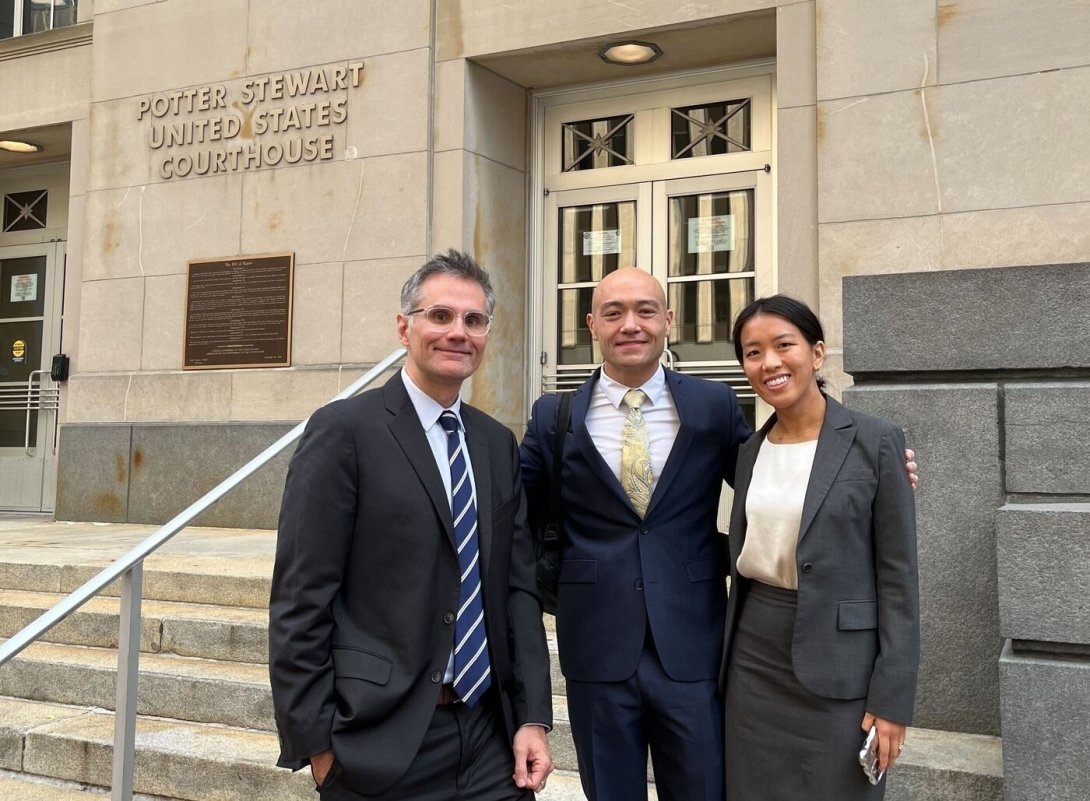
Free Press’ Matt Wood and Yanni Chen flank Daniel Woofter, the attorney who represented Free Press and allies in the court case to save Title II and Net Neutrality.
We suffered a big loss in early 2025, when the U.S. Court of Appeals for the 6th Circuit sided with industry and overturned the Biden FCC’s 2024 decision. A three-judge panel issued this flawed ruling, which Free Press Vice President of Policy and General Counsel Matt Wood described as “wrong at every level of analysis.” In February, we filed a petition calling on the full appeals court to hear the case.
After the court refused our request, we debated bringing the case to the Supreme Court — but decided against it in August. “The odds were just not in our favor,” said Yanni Chen, “and after deliberation, we decided that pursuing further appeal could create an even worse outcome for the public interest.”
Despite these setbacks, Free Press will continue to fight for an open, fair and free communications network for all — and will keep monitoring how companies like AT&T, Comcast and Verizon treat their customers.
CLOSING THE DIGITAL DIVIDE
Back in 2021, Free Press Action’s advocacy paved the way for historic broadband provisions in the infrastructure package. In 2023, the Biden administration announced $42 billion in funding for the Broadband Equity, Access, and Deployment program, which grew out of the infrastructure bill. The money from the BEAD program was designed to help all 50 states build high-speed internet networks in communities that lack access.
But now, in 2025, the Trump administration is undermining the program — with changes that would directly benefit Elon Musk’s Starlink satellite-internet service. A Free Press investigation of a program created during the first Trump administration found that Starlink and other providers sought subsidies to bring internet access to unoccupied parking lots and traffic islands, as well as to urban areas that other companies already served. Thanks to S. Derek Turner’s research, the Biden FCC stripped $886 million in subsidies from Starlink. Under the BEAD program, Congress had required states to prioritize broadband deployments that would provide the best and most reliable service. We are tracking giveaways to Musk and any other attempts to sabotage this program.
In May, Trump threatened to eliminate funding for programs created under the Digital Equity Act, targeting $2.75 billion in federal grants that Congress had committed in 2021’s infrastructure bill to help close the digital divide. Earlier in the year, Government Relations Director Amanda Beckham, Senior Campaign Director Heather Franklin and Matt Wood trained people from all over the country to advocate for their work in digital equity and then escorted them to meetings at the Capitol with their lawmakers. The goal: to get members of Congress to demand that the Commerce Department release the funding their states had been promised.
The fight to overturn the Trump administration’s canceling of Digital Equity Act funding is ongoing. Twenty-two states sued the Commerce Department in July, and we likely won’t see any resolution until later this year. Free Press Action will continue to put pressure on lawmakers to speak out.
In 2024, the Biden FCC expanded access to billions of dollars in federal funding to ensure that schools and libraries across the country would have reliable and affordable broadband. After the Trump FCC — with the support of Sen. Ted Cruz — announced a plan to eliminate this program, Free Press pushed the agency to preserve it, noting that this proposal would make life harder for millions of families. Unfortunately the agency voted along party lines to end this program.
While we’ve made great strides in closing the digital divide, broadband adoption in low-income households remains far behind adoption in higher-income homes. Though temporary, the Affordable Connectivity Program that Free Press Action fought for proved that steep prices are the primary barrier for low-income people seeking to get online. We will continue to work in Congress and at the FCC to create a permanent low-income broadband subsidy to ensure that everyone can access high-speed internet.
OPPOSING TRUMP’S TRASHING OF THE FTC
In March, Trump fired Democratic FTC Commissioners Rebecca Kelly Slaughter and Alvaro Bedoya without cause, defying a long-standing Supreme Court precedent. This was an unlawful attempt to destroy an agency charged with preventing fraud, deception and unfair practices. The two commissioners subsequently sued the administration, and Free Press is urging the courts and Congress to stop enabling the Trump administration’s attacks on independent agencies.
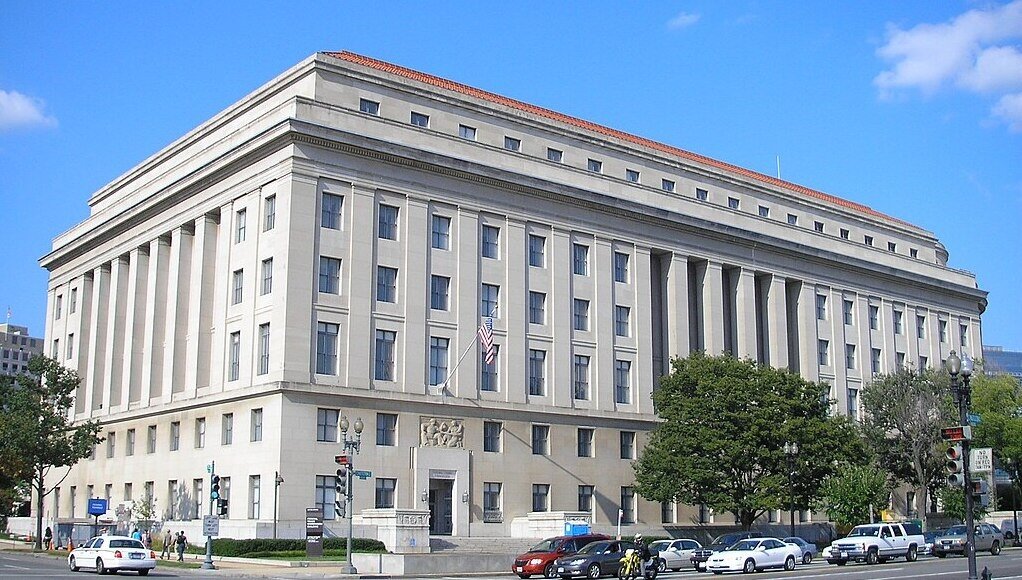
Trump is doing everything he can to undermine agencies like the Federal Trade Commission.
Original photo by Wikimedia Commons user Gryffindor
Free Press spoke out when Trump announced that he would elevate Federal Trade Commissioner Andrew Ferguson to serve as chairman of the agency. “Andrew Ferguson is an extreme pick for FTC chair,” said Jessica J. González. “He has openly suggested that the government should force social-media platforms to leave up hate and disinformation — and investigate companies that elect not to advertise next to hateful and extremist content.”
Our warnings were borne out when Ferguson launched an inquiry into whether and how tech platforms deny or degrade users’ access based on their speech or affiliations. This inquiry reflects an unconstitutional intrusion into content-based censorship.
“Free Press continues to push tech platforms to adopt content-moderation policies and practices that are more robust, transparent and responsive to the interests and needs of users,” said Advocacy Director Jenna Ruddock. “Yet we also recognize that government intervention in these decisions is unwise and unlawful. Any action the FTC undertakes here could easily travel down a slippery slope to censorship, and that seems to be the point.” In May, we filed comments urging the FTC to preserve tech platforms’ First Amendment right to create their own content-moderation policies.
PROTECTING PRIVACY AND FIGHTING SURVEILLANCE
Free Press spoke out as soon as Elon Musk and his Department of Government Efficiency started abusing its government standing to collect Americans’ private data. In February, we convened a panel of experts to participate in our webinar “Into the Breach: Exposing Musk’s Assault on the Privacy Rights of All Americans,” which Jenna Ruddock moderated. The discussion explored how Musk’s takeover of several agencies set in motion what may be the largest data breach in U.S. history — with our panelists highlighting how DOGE reportedly accessed classified information, millions of Americans’ sensitive personal and financial data, and the Treasury Department systems that control everything from Social Security payments to tax refunds.

Flickr user Gage Skidmore
Later this fall Free Press Action will be launching a Solidarity Over Surveillance Campaign with our partners in the Disinfo Defense League. The goal is to raise awareness about tech’s role in the surveillance state — and to call on state leaders to pass laws to limit overreach and abuse.
CONFRONTING AI ABUSES
Free Press is working to rein in tech companies intent on supercharging AI at the expense of local communities. We’re forging alliances with tech-justice groups mobilizing against the harmful consequences of data centers. Free Press Action and allies helped defeat a dangerous provision in Trump’s megabill that would have blocked state governments from regulating AI for 10 years. We worked with community groups to stop data-center construction in Tucson, Arizona, and are supporting efforts to block such projects in Memphis and elsewhere.
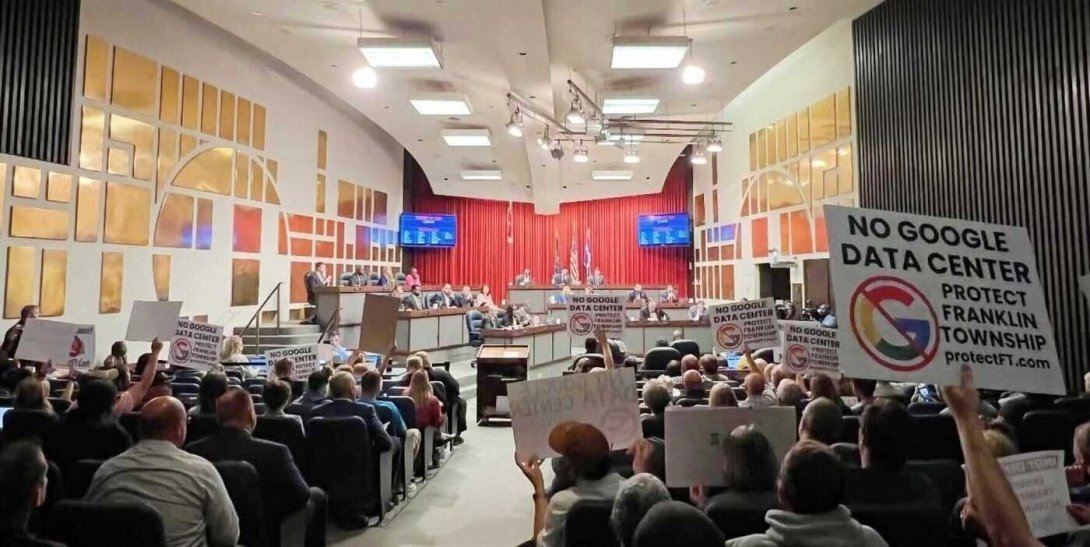
Citizens Action Coalition Indiana’s Instagram page
As the Trump administration races to clear the way for data-center infrastructure, Jenna Ruddock is leading our work on the environmental impacts of these facilities — and their role in facilitating surveillance. Free Press helps lead the Athena Data Center Working Group, a subset of the broader Athena Coalition. The coalition is working to ensure that local communities have a voice in AI’s future.
Free Press is also exposing how AI models and algorithms are built and trained on decades of institutionalized discrimination and segregation. In 2024, Free Press Action supported the Artificial Intelligence Civil Rights Act, which would help eliminate these kinds of biases from AI tools. Sen. Ed Markey reintroduced the bill in September, and we plan to mobilize support for this important legislation.
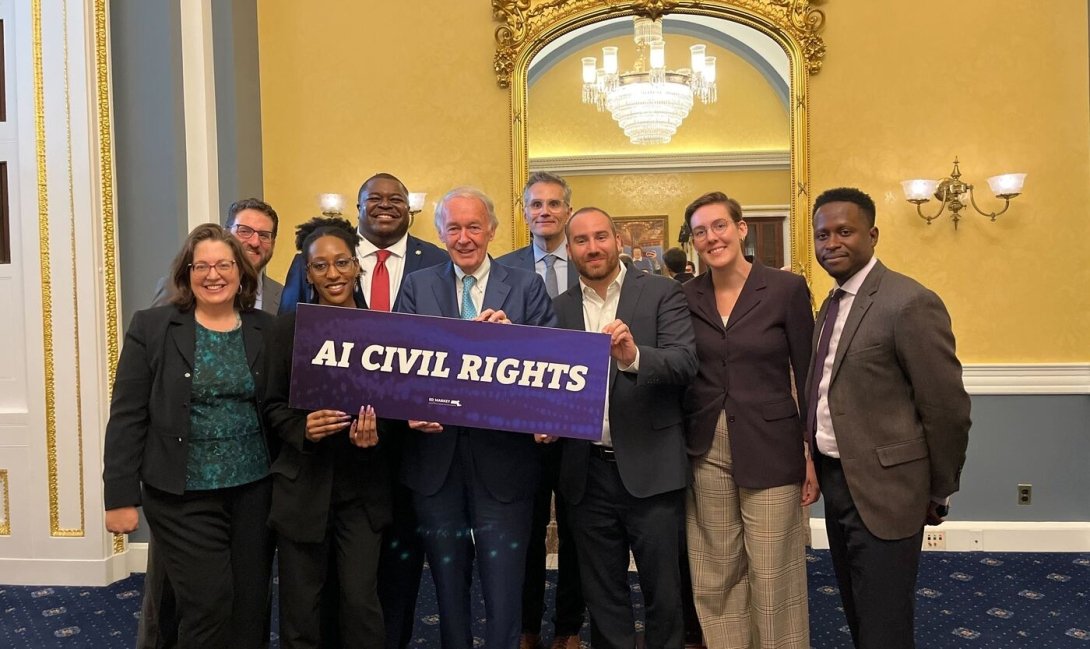
Free Press Action staff and allies with Sen. Ed Markey (center) at the introduction of the Artificial Intelligence Civil Rights Act
DEFENDING FREE EXPRESSION ONLINE
In 2024, Free Press signed on to an amicus brief arguing that the TikTok ban violates the First Amendment by restricting Americans’ right to access information and media from abroad. We also noted that singling out TikTok to curb its invasive data-collection practices does nothing to address the same practices found on the vast majority of websites, mobile apps and other platforms.
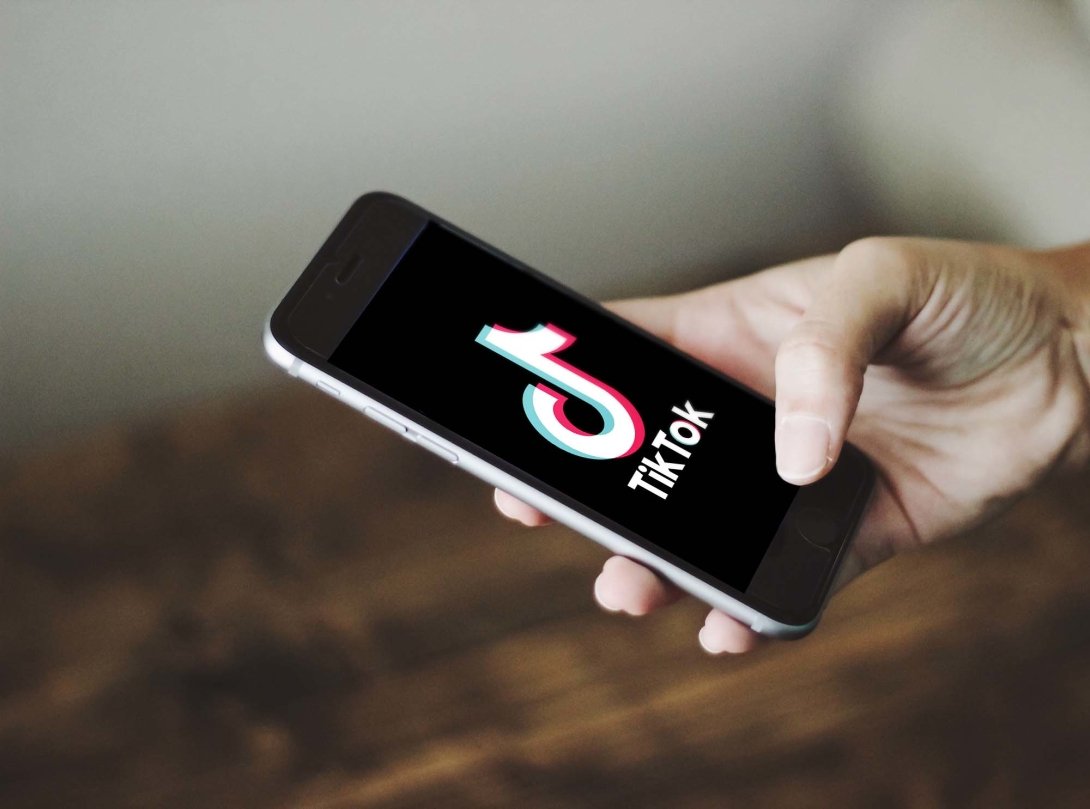
Original photo by Flickr user Nordskov Media
Unfortunately, in early 2025 the Supreme Court upheld the TikTok ban. And in September, Trump issued an executive order that clears a path for the transfer of ownership of TikTok’s U.S. operations to a consortium of private-equity funds, media corporations and tech companies that his political allies control. We condemned this move as further proof of Trump’s determination to crush dissent.
“Handing control of TikTok to mega-wealthy presidential yes men is the kind of move we’ve seen in other repressive regimes — the same ones the United States once criticized for their blatant disregard of democratic principles,” said Nora Benavidez. “It’s clearer than ever that we need a broad-based and full-throated rejection of Trump’s campaign against free speech.”
In August, we joined an amicus brief urging the U.S. Court of Appeals for the 1st Circuit to strike down an unconstitutional law in Puerto Rico that undermines residents’ First Amendment rights. The law criminalizes speech during state-declared emergencies and disasters — giving the government the ability to label speech it disagrees with as “false” and prosecute accordingly. “Countries like Egypt, Singapore, and Russia have used similar ‘false information’ laws to suppress the speech of private citizens, political dissidents, and members of the press, all to the detriment of free expression,” the brief reads.
In 2023 and 2024, Free Press documented how tech platforms rolled back content-moderation policies, laid off crucial teams and reinstated dangerous accounts. These trends accelerated this year as tech CEOs sought to curry favor with Trump — with Meta abandoning professional third-party content moderation and fact checking in January. “Everyone should be concerned when major technology firms and their billionaire owners kowtow to a leader like Trump who is intent on undermining the checks and balances that are fundamental to a healthy democracy,” said Nora Benavidez.
THWARTING ATTACKS ON NONPROFITS
In 2024, Free Press Action helped lead opposition to the Stop Terror-Financing and Tax Penalties on American Hostages Act, a bill whose misleading name cloaked its true intention: undermining free speech and crushing dissent. The legislation would give the executive branch broad powers to revoke the tax-exempt status of a nonprofit group by merely claiming that it is a “terrorist supporting organization.”
The possibility for abuse with this kind of legislation is immense. It would enable the government to intimidate and punish nonprofit newsrooms that are working to hold leaders accountable — as well as any nonprofit groups that have angered the Trump administration.
After working with other groups to stop H.R. 9495 from getting a vote in the Senate last year, Free Press Action spoke out again in 2025 when House Republicans attached the bill to a must-pass budget-reconciliation bill in May. After it passed the House Ways and Means Committee along party lines, the outcry from Free Press Action and other groups stopped it from moving forward. We will fight back again if it’s reintroduced.
REACHING NEW AUDIENCES
In July, Free Press launched Pressing Issues, a twice-weekly newsletter with ideas and analysis about everything happening at the intersection of media, technology and democracy. Craig Aaron and Senior Producer and Strategist Julio Ricardo Varela created Pressing Issues, which features contributions from a range of in-house experts as well as interviews with prominent media figures.
The newsletter has covered topics ranging from Paramount’s capitulation to the Trump regime to an L.A. newsroom’s coverage of ICE raids. “We’re driven by a belief that the media isn’t just something that happens to us,” wrote Craig Aaron in the inaugural column. “It’s something that we can and must shape and change to create a true multiracial democracy.”
GETTING THE WORD OUT
We have had more than 2,300 press hits so far this year in outlets including the Associated Press, Bloomberg, CNN, NBC, The New York Times, Reuters and The Washington Post. We also worked with smaller newsrooms, placing Op-Eds in outlets including the nonprofits Next City and The Objective.
To join our community online and stay up to date on our work, you can follow Free Press on Bluesky, Facebook, Instagram, Threads and TikTok.
FUND THE FIGHT
Your generosity makes our work possible. Please give what you can today to make sure we have the resources we need to combat authoritarianism and push for equitable media and tech policies that improve people’s lives. We’re actively fundraising to ensure we maintain and expand our skilled capacity to fight for your rights to connect and communicate in the future. You can give with confidence knowing that Free Press and Free Press Action do not accept money from business, government or political parties.
You can support us by making a one-time or monthly donation below or by mailing a check to P.O. Box 60238, Florence, MA 01062. You can also make a contribution through a donor-advised fund, a gift of stocks or securities, or a planned gift. For more information, please visit other ways to give or reach out to us.
Help support our research, public education and organizing work in Washington and across the United States. Gifts to Free Press are tax deductible as allowed by law.
Help us mobilize direct and grassroots advocacy efforts that oppose or support specific federal or state policies or legislation and advance the public interest. Gifts to Free Press Action are not tax deductible.
Thank you for your support!